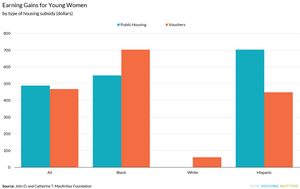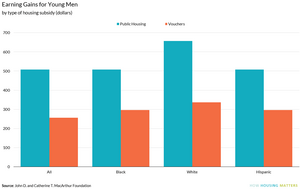
Living in Subsidized Housing Is Positively Associated with Adult Well-Being
- Title:
- Living in Subsidized Housing Is Positively Associated with Adult Well-Being
- Author:
-
Fredrik Andersson, John C. Haltiwanger, Mark J. Kutzbach, Giordano E. Palloni, Henry O. Pollakowski, Daniel H. Weinberg
- Source:
-
MacArthur Foundation
- Publication Date:
-
2017
How does living in subsidized housing as a teenager relate to annual earnings and incarceration as an adult? This paper clarifies how housing matters for many low-income families, finding that more time spent in public or voucher-assisted housing helps children later in life. Fredrik Andersson and his colleagues created a longitudinal dataset that merged administrative housing and decennial census data to follow a large national sample of teenagers as of the 2000 census through age 26. They used these data to perform sibling comparisons to determine the effect of time spent in public or voucher-supported housing on adult well-being, measured by annual earnings at age 26 and incarceration status in April 2010. The key to this effort is the comparison of siblings who grew up in the same household, which allowed the researchers to isolate the link between time spent living in public or voucher-assisted housing and adult outcomes. The researchers found that controlling for households’ selection into housing programs removes the substantial negative association of childhood housing participation and adult outcomes.
Key findings:
- Living in subsidized housing as a teenager was positively associated with annual adult earnings for both males and females at age 26. Each year spent living in public housing as a teenager was linked with an extra $488 in annual earnings for females and $508 for males. For every year spent in voucher-assisted housing, an additional $468 was associated with female annual earnings and an additional $256 was associated with males.
- The positive effect of living in subsidized housing and adult annual earnings varied by race and was largest for Hispanics and non-Hispanic blacks.
- The positive effects of living in subsidized housing were largely unaffected after considering neighborhood poverty. Accounting for neighborhood poverty suggests that more time in public housing is associated with slightly higher annual earnings at age 26.
- Subsidized housing was associated with a reduced likelihood of incarceration in 2010 for both genders. Each additional year spent living in public housing was linked with a reduced likelihood of incarceration by 0.5 percentage points for females and 0.2 percentage points for males. For every year spent living in voucher-assisted housing, females and males were 0.4 and 0.1 percentage points less likely to be incarcerated, respectively, in 2010.

